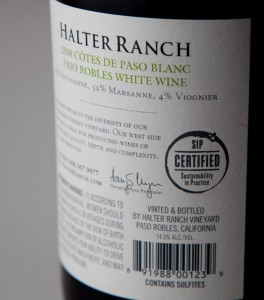
As we travel around and visit wineries we have often seen SIP certified signs. We also see organic and Bio-dynamic tossed around as well. So you have any number of certifications to show you care. Here is a partial list;

USDA Organic. ...
“Made with Organic Grapes” ...
EU Organic. ...
SIP Certified (Sustainability in Practice) ...
Certified Green (The Lodi Rules) ...
Salmon Safe.
Certified California Sustainable Vineyard and Winery (CCSW)
The U.S. government regulates use of the term “organic,” but “sustainable” and “biodynamic” have no legal definitions. So there are two types of organic listings on wine bottles. Wines can be made from certified organically grown grapes, avoiding any synthetic pesticides or additives, or, to take it a step further, “organic” wines are made from organically grown grapes, and are also made without any added sulfites (although naturally occurring sulfites will always be present).
Sustainability refers to a range of practices that are not only ecologically sound, but are also economically viable and socially responsible. Sustainable farmers may farm largely organically or biodynamically but have flexibility to choose what works best for their individual property and they also focus on energy and water conservation, the use of renewable resources and other issues.
Some third-party agencies offer sustainability certifications, and many regional industry associations are working on developing clearer standards.
 Sustainability in Practice (SIP) Certified is a certification agency that helps farmers and winemakers demonstrate their dedication to preserving and protecting natural as well as human resources. SIP Certified is a rigorous sustainable vineyard and winery certification that has strict, non-negotiable requirements and standards that are based on science and expert input with independent verification, transparency, and absence of conflict of interest.
Sustainability in Practice (SIP) Certified is a certification agency that helps farmers and winemakers demonstrate their dedication to preserving and protecting natural as well as human resources. SIP Certified is a rigorous sustainable vineyard and winery certification that has strict, non-negotiable requirements and standards that are based on science and expert input with independent verification, transparency, and absence of conflict of interest.Both Sustainability in Practice (SIP) Certified and the Certified California Sustainable Winegrowing (CCSW) programs are important supporters of the sustainability movement and encourage responsible vineyards and winemaking, but there are a couple distinct differences. As an example with SIP You must have a winter cover crop, whereas with a CCSW program you have a plan to prevent erosion during winter?
SIP Certified is all about the 3 P’s of Sustainability – People, Planet and Prosperity. So we will be taking a look at each of these 3 P's individually and talk with wineries and vineyards that follow these practices to get two cents worth as well in some upcoming articles. We might even have a taste or two if all goes well.
In the mean time look around as you drive through the vineyards and see if you can spot these SIP certified signs.
Happy Tasting Adventures,
Cheers,
No comments:
Post a Comment
We are always on a WineWalkabout looking for a good drop. Please comment and ask questions about the things you like or would like to read and see. Don't drink without pants on!